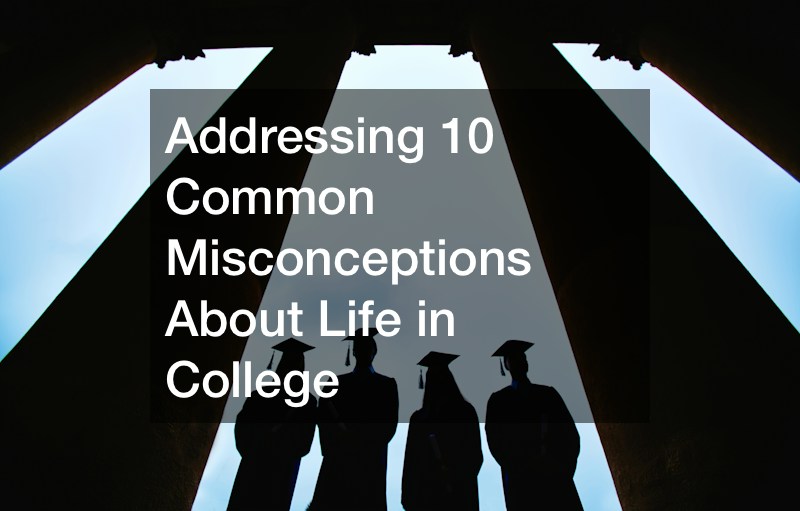
During the summer before you go to college, you’ll probably have many people advising you about college life. But every person who goes to college is different, and your college experience will be different from anyone else’s. Here are some pieces of advice about college life that may turn out to be untrue:
1. You’ll Have Time to Go on Big Trips

There will be a big adjustment when you first get to college. College classes are very different from high school classes. One of the biggest differences will be the expectations about how much of your classwork must be done independently. Going to lectures will only review the basics, and when you get back to the dorm, there won’t be anyone to remind you to do your homework.
Going to college puts you in charge of your days. However, many first-year college students may never have had that responsibility before. Many new college students find, that without someone urging them to study, they procrastinate regarding course requirements. Therefore, it’s unlikely a college student would borrow the family RV and take it for RV repair – since they won’t have time to use it.
There are sometimes trips available in college as part of the curriculum – or as a member of an extracurricular group. But with classes, studying, and extracurricular activities, most students don’t have the time – except during semester breaks. Students who must work part-time will have even less free time to go on trips. If you went to college thinking you’d be going on big trips, you will likely find that’s one of the common misconceptions about college life.
2. You’ll Always Have Money to Go to Big Music Festivals
A music festival might tour near your college – or your college music program may hold a music festival. But, if you thought your college years would bring lots of opportunities to travel to big music festivals, you’re likely to find this is one of the common misconceptions about college life. College students may dream of the opportunity to travel to a big festival, but the same hindrances preventing students from making trips will likely keep them from attending festivals.
Since part of this misconception is believing you’ll have money for a festival, let’s address college finances. Some students’ parents provide their dorm fees, food, books, and supplies. But no matter how much living allowance they may get, it’s questionable whether those students’ parents would provide extra money for a festival. Students who support themselves or who must work for spending money would have less of a chance to go to a music festival.
Going to a music festival can be a great experience, and hearing the music you love as part of a crowd can be amazing. Some of the adventures of a music festival may not be glamorous – like sleeping outdoors in a tent. Standing in line to use a porta potty isn’t much fun, either. But you might still wish you could go.
3. It’ll Be Easy for You to Get in Trouble
Parents often worry about their children getting into trouble at college. Your parents may warn you that trouble is lurking around every corner. While the lack of supervision may leave you feeling you can do as you please, the laws of the town will be as stringent as those back home. According to the Yale Student newspaper, approximately 30,000 crimes against people or property were documented at colleges in 2019.
Avoiding legal problems is the best strategy. For example, many college students use the excuse of having no supervision to indulge in underage drinking. Look for friends who want to have lawful fun and spend your free time with them – so you won’t have any opportunities to disobey the law. Another thing to do is get involved in positive extracurricular activities, which will occupy your free time in lawful ways.
Your determination to follow the law will determine how likely you will be to get in trouble. If you stay on the right side of the law, you won’t need to learn about bail bonds from personal experience. Therefore, whether you see this piece of advice as one of the common misconceptions about life will be up to your choices.
4. College Is Your Only Option

Going to college may not have been your first choice. Many people may have urged you to go and held the opinion that college is your ‘only’ option. However, limiting your career options to those requiring a college degree can be one of the common misconceptions about life.
There are many professions where you earn a good living without a college degree. For example, if you enjoyed a summer job, you might enjoy making it your full-time job. When selecting something you’ll want to do for the rest of your life, it’s only fair that you love the job.
Many jobs related to the construction industry pay very well and provide a much-needed service for homeowners and business owners. For example, many people make their living installing home siding. According to Salary Expert, an online salary data analysis resource, the national average salary for a siding contractor is between $30,500 and $78,000.
5. You’ll Have to Abandon Your Life Before College
While you were getting ready for college, many of your friends may have feared you would forget about them. Your personal experience may show this is one of the common misconceptions about life at college. College life and activities will lead you to evolve into a different person, so the person your old friends remember is unlikely to remain the same.
But, if the pandemic taught us anything, it taught us that keeping in touch with the people we love is possible. We can contact our friends through programs like Zoom and talk to them as often as possible. The changes in you will still happen, but your friends will see and keep track of them. It may be most challenging to keep up with your high school romance, but it can happen if you do your best.
You can also keep in touch with some of the groups you used to be part of. For example, some college students can contact their small church groups back home via Zoom. Those groups may help you feel connected to friends back home while still allowing you to evolve into the person you are starting to become.
6. You Should Choose Whichever Major Will Make You the Most Money
You may discover the college major your parents prefer may not be the one that resonates with you. But, if earnings were the only factor in choosing a career, everyone would be an engineering major (with annual salaries averaging from $62,000 to $74,000). While engineering careers may give you a financially secure life, it may not be your preferred profession.
Suppose your college allows you to delay declaring a major until you complete your first or second year. You can spend those two years taking core curriculum courses in almost every major, such as English, history, math, and psychology. You may also meet people from many different professions during those two years.
Learning from those people might spark an idea that may lead you to find one you want to try. Your encounters may lead you to conclude the necessity for a profitable major is one of the common misconceptions about life in college. For example, becoming a cremation service professional is always needed, and it helps people. While the salary of a cremation professional may not be equal to that of an engineer, it may be sufficient for the life you’ve planned.
7. Other Students Won’t Steal from You

It’s sad to say, but this is another of the common misconceptions about college life. According to the National Center for Education Statistics, 6,800 burglaries were reported on college campuses in 2019. Even if your dormitory has security cameras in the hallways, there may still be theft in your dorm room.
Securing your belongings from people living in your dormitory may seem petty. However, it’s a fact of college life that you need to be aware of. Take a few simple precautions, including placing a locked cabinet inside your closet for valuables. If the dresser in your dorm room allows locking one of its drawers, you should keep at least one drawer locked.
When you leave the room, hide your cash in the secured cabinet in your room. You can purchase an intrinsically safe iPhone case to keep your iPhone secure. This type of phone case will ensure you can use your phone in areas with hazardous materials – and a specially designed case can keep it from being used by a thief.
8. You Need to Look Your Best During Class
Most people who’ve recently attended a college class would know this advice is a common misconception about life at college. Unless there is a strict dress code, most college students dress casually. The most influential factor seems to be comfort, as many will wear sweats or jeans with casual tops. You may also want to buy clothes at the school store with a school logo or motto to show your school spirit.
Your mode of dress should depend on your fashion standards. Dress in a way that makes you feel comfortable. If you want to style your hair or dress in fancy clothes, you should do that. If it makes you feel good to get a manicure before class, you should do that, too. If you join a fraternity or sorority, you may need to dress according to the guidelines of that group.
9. You Won’t Have Time for Hobbies
Although your time will be limited, people who warn you about not having time for anything but studying may be exaggerating. One of the many common misconceptions about life at college is that you’ll do nothing but study. But, after you get used to the routine of college life, you can typically find time to participate in your hobbies.
Look at notices in the student center to see if any extracurricular groups are participating in a hobby you enjoy. If your campus is large and you have a heavy course schedule, you might find out if shuttle buses are available. Some large campuses may rent golf carts for you to go to the location of the group meeting.
You might also find out the nearby town has cultural and historic sites you can visit. If you go into town for groceries, and the city has a Visitor’s Center, you should check there for opportunities. You may be surprised what you can discover if you spend a few hours in the town near your college.
10. You Should Only Go to the Most Prestigious College

Remember: you don’t have to study a specific subject if you believe you’d be happier with a different choice. You also don’t have to choose a big-name college because of its reputation. It’s a common misconception about life that people from prestigious colleges are more likely to have happier lives. While graduates of prestigious colleges have real advantages when competing for jobs in some professions, getting that prestigious job may not be what you aspire to.
Some of the most important lessons you may learn during your college years may not be from classrooms. The process of maturity you are undergoing may profoundly impact you more than your college courses. A degree from a college is worth getting, but it doesn’t have to dictate your future.
For example, you may have begun college believing you would be a personal injury lawyer. Your years at college may have caused you to discover that while you enjoy the prospect of standing up for people’s rights, you may derive more satisfaction from doing it as a social worker or a politician. This decision may have resulted in a change of major – or a decision to go to graduate school.
No matter what you gain from your years at college, don’t let any of the common misconceptions of life deter you from true happiness. It’s your life, and you can discover your true career path in college. Just keep an open mind and stay ready to find yourself.



